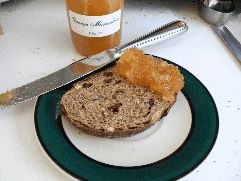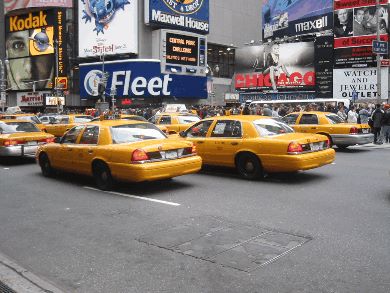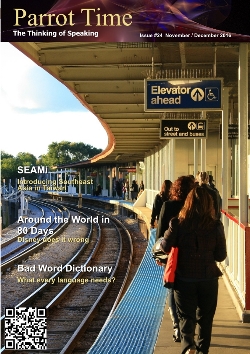
|
Editor's note: This article is a reprint from "Stories That Words Tell Us" By Elizabeth O'Neill. It was published in 1918, but still gives a good insight on how and why slang is made. Also, compare which slang words it talks to are still in use today and see if its predictions proved true. Every child has some idea of what is meant by "slang," because most schoolboys and schoolgirls have been corrected for using it. By slang we mean words and expressions which are not the ordinary words for the ideas which they express, but which are invented as new names or phrases for these ideas, and are at first known and used only by a few people who use them just among themselves. There are all kinds of slang--slang used by schoolboys and schoolgirls in general, slang used by the pupils of each special school, slang used by soldiers, a different slang used by their officers, and even slang used by members of Parliament. The chief value of slang to the people who use it is that at first, at any rate, it is only understood by the inventors and their friends. The slang of any public school is continually changing, because as soon as the expressions become known and used by other people the inventors begin to invent once more, and get a new set of slang terms. Sometimes a slang word will be used for years by one class of people without becoming common because it describes something of which ordinary people have no experience, and therefore do not mention. The making of slang is really the making of language. Early men must have invented new words just as the slang-makers do to-day. The difference is that there are already words to describe the things which the slang words describe. It may seem curious, then, that people should trouble to find new words. The reason they do so is often that they want to be different from other people, and sometimes because the slang word is much more expressive than the ordinary word.  Would like some swish on your bagel? This is one reason that the slang of a small number of people spreads and becomes general. Sometimes the slang word is so much better in this way than the old word that it becomes more generally used than it, and finds its way into the ordinary dictionaries. When this happens it is no longer slang. But, as a rule, slang is ugly or meaningless, and it is very often vulgar. However common its use may become, the best judges will not use such expressions, and they remain mere slang. A writer on the subject of slang has given us two good examples of meaningless and expressive slang. The people who first called marmalade "swish" could have no reason for inventing the new name except to seem odd and different from other people. Swish is certainly not a more expressive or descriptive word than marmalade. The one means nothing, while the other has an interesting history coming to us through the French from two old Greek words meaning "apple" and "honey." But, as a rule, slang is ugly or meaningless, and it is very often vulgar. The expressive word which this writer quotes is swag, a slang word for "stolen goods." There is no doubt that swag is a much more expressive word than any of the ordinary words used to describe the same thing. One gets a much more vivid picture from the sentence, "The thieves got off with the swag," than he would had the word prize or even plunder or booty been used. Yet there is no sign that the word swag will become good English. Expressive as it is, there is a vulgar flavour about it which would make people who are at all fastidious in their language very unwilling to use it. Yet many words and phrases which must have seemed equally vulgar when first used have come to be accepted as good English. And in fact much of our language, and especially metaphorical words and phrases, were once slang. It will be interesting to examine some examples of old slang which have now become good English. One common form of slang is the use of expressions connected with sport as metaphors in speaking of other things. Thus it is slang to say that we were "in at the death" when we mean that we stayed to the end of a meeting or performance. This is, of course, a metaphor from hunting. People who follow the hounds until the fox is caught and killed are "in at the death." Another such expression is to "toe the mark." We say a person is made to "toe the line" or "toe the mark" when he or she is subjected to discipline; but it is a slang phrase, and only good English in its literal meaning of standing with the toes touching a line in starting a race, etc., so that all may have an equal chance. We say a person has "hit below the belt" if we think he has done or said something unfair in an argument or quarrel. This is a real slang phrase, and is only good English in the literal sense in which it is used in boxing, where it is against the rules to "hit below the belt." The term "up to you," by which is expressed in a slang way that the person so addressed is expected to do something, is a slang expression borrowed from cards.  They were once "cabriolet" but got shortened to "cab" then evolved into "taxicab." Now they are "taxicabs", "taxis" or "cabs", depending on which slang was adopted. Even from these few examples we can see that there are various degrees in slang. A person who would be content to use the expression "toe the line" might easily think it rather coarse to accuse an opponent of "hitting below the belt." There comes a time when some slang almost ceases to be slang, and though good writers will not use it in writing, quite serious people will use it in merely speaking. It has passed out of the stage of mere slang to become a "colloquialism." The phrases we have quoted from present-day sport when used in a general sense are still for the most part slang; but many phrases taken from old sports and games, and which must have been slang in their time, are now quite good English and even dignified style. We speak of "wrestling with a difficulty" or "parrying a thrust" (a metaphor taken, of course, from fencing), of "winning the palm," and so on, all of which are not only picturesque but quite dignified English. A very common form of slang is what are called "clipped" words. Such words are gov for "governor," bike for "bicycle," flu for "influenza," indi for "indigestion," rec for "recreation," loony for "lunatic," pub for "public house," exam for "examination," maths for "mathematics." All of these words are real slang, and most of them are quite vulgar. There is no sign that any of them will become good English. The most likely to survive in ordinary speech is perhaps exam. [Editor: Note that most of these slang terms are either still in use or have completely replaced the originial word. We visit a "pub", not a "public house".] Yet we have numbers of short words which have now become the ordinary names for certain articles, and yet which are only short forms of the original names of those articles. The first man who said bus for "omnibus" must have seemed quite an adventurer. He probably struck those who heard him as a little vulgar; but hardly any one now uses the word omnibus (which is in itself an interesting word, being the Latin word meaning "for all"), except, perhaps, the omnibus companies in their posters. Again, very few people use the full phrase "Zoological Gardens" now. Children are taken to the Zoo. Cycle for "bicycle" is quite dignified and proper, though bike is certainly vulgar. In the hurry of life to-day people more frequently phone than "telephone" to each other, and we can send a wire instead of a "telegram" without any risk of vulgarity. The word cab replaced the more magnificent "cabriolet," and then with the progress of invention we got the "taxicab." It is now the turn of cab to be dropped, and when we are in haste we hail a taxi. No one nowadays, except the people who sell them, speaks of "pianofortes." They have all become pianos in ordinary speech. The way in which good English becomes slang is well illustrated by an essay of the great English writer Dean Swift, in the famous paper called "The Tatler," in 1710. He, as a fastidious user of English, was much vexed by what he called the "continual corruption of the English tongue." He objected especially to the clipping of words--the use of the first syllable of a word instead of the whole word. "We cram one syllable and cut off the rest," he said, "as the owl fattened her mice after she had cut off their legs to prevent their running away." One word the Dean seemed especially to hate--mob, which, indeed, was richer by one letter in his day, for he sometimes wrote it mobb. Mob is, of course, quite good English now to describe a disorderly crowd of people, and we should think it very curious if any one used the full expression for which it stands. Mob is short for the Latin phrase mobile vulgus, which means "excitable crowd." |
| Revisited - Slang | ||||||
| Writer: | Elizabeth O'Neill | |||||
| Images: | ||||||
| ||||||
| Sources: | ||||||
| ||||||
All images are Copyright - CC BY-SA (Creative Commons Share Alike) by their respective owners, except for Petey, which is Public Domain (PD) or unless otherwise noted.
comments powered by Disqus



















